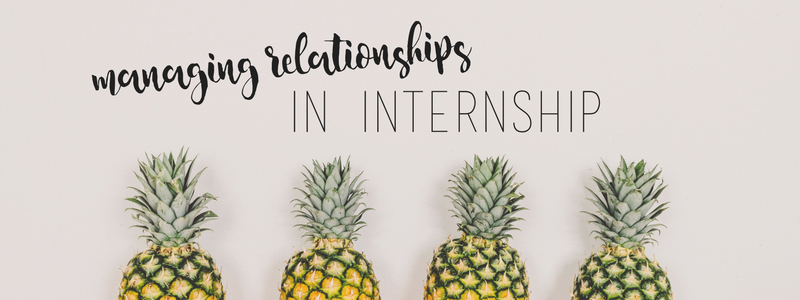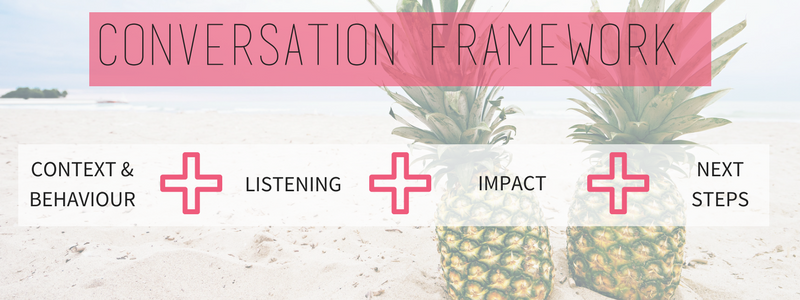Dietetics:Internship/Managing Relationships In Internship 2018
Relevance To Dietetics Student Learning
Managing relationships effectively is an important component of both personal and professional development. Through building rapport, navigating feedback conversations, and developing your emotional intelligence, you can elevate your relationships and get the most out of your experience in internship.
There are so many layers to navigating relationships - people are complex! This page focuses on three important topics under the umbrella of managing relationships that directly relate to your experience in internship, as well as offers tangible resources for you to further your learning. We hope you enjoy!
- How this topic links to ICDEP competencies: this topic is linked to 20 different competencies within the ICDEP document. A few notable ones:
- Professional Practice:
- 1.02 m: Demonstrate knowledge of the elements of professional boundaries.
- 1.04: Practice within limits of individual level of professional knowledge and skills.
- 1.05: Address professional development needs. Taking control of your own learning
- Communication & Collaboration:
- 2.01 a: Demonstrate knowledge of opportunities for and barriers to communication.
- 2.04: Use effective interpersonal skills.
- 2.04 m: Demonstrate knowledge of effective ways to give and receive feedback.
- Professional Practice:
Summary of Key Principles
Building Rapport
- Being able to build rapport with people is essential to our success in internship and it is something we will be doing all throughout our careers.
- Building rapport:
- Creates a positive and enjoyable work environment
- Is professional and respectable
- Is key to building relationships and becoming comfortable with colleagues
- Leaves a good impression and can possibly leave doors open for future opportunities
- Some tips from RD’s and Interns on building rapport:
- Participate and ask questions, don’t be shy to speak up
- Try to get to know others, have some conversations that are not work related
- Do your best to remember names and address people by their names
- Use counselling skills when talking to others such as active listening and empathy
Giving & Receiving Feedback
- Effective feedback is an important part of developing and managing relationships
- Get clear on how feedback is delivered, as it goes in both directions
- during internship students will receive feedback as well as be expected to provide feedback
- Get clear on how feedback is delivered, as it goes in both directions
- Effective feedback is:
- Clear - use clear language to avoid ambiguity
- Specific - utilize examples to support feedback
- Timely - provided at an agreed upon or appropriate time
- Balanced - both positive and constructive
- Constructive - feedback should be helpful and purposeful
- Communicated well - appropriate verbal and non-verbal communication
- Utilizing a framework to approach giving feedback can be helpful
- Students can access a "Real Conversations" framework through Canvas as an example
- Another useful tool is the "Engaged Feedback Checklist" that can be found in the "Resources" section at the bottom of the wiki, from Brené Brown's "Daring Greatly"
Emotional Intelligence
What is Emotional Intelligence (EI)
- "Capacity to be aware of, control and express our emotions, while handling interpersonal relationships judiciously and empathetically" (Oxford Dictionaries, 2018)
- Our psychological make-up includes our personality, IQ and EI
- IQ & personality are stays mostly constant throughout our lives whereas EI can be developed overtime (e.g. prior to internship or at the early stages of our dietetics career)
- EI can enhance our internship experience by learning how to navigate challenging social situations
- How do we develop EI?
- To improve our relationships with others, we must first bring the focus on ourselves. This involves understanding our emotions and learning how to manage them (inward reflection). Once we learn how to manage our emotions and our emotional response, we can work on improving social awareness and our relationships (outward facing).
- Inward Facing: self-awareness, self-management
- Outward Facing: social awareness, relationship development
Here are four topics of emotional intelligence that may be of interest as we approach internship:
[1] Reaction Time: Fast vs. Slow Thinking
- Fast Thinking: highly emotional
- making quick decisions, allows us to perform day-to-day task with ease
- may result in relying on our biases and assumptions to make quick decisions
- Slow Thinking: deliberate, logical, intuitive
- reshaping our judgements, reinterpreting situations, changing our response to disrupt 'automatic thinking'
[2] Cognitive Hijacking
- Cognitive hijacking is the process by which one has an emotional reaction in response to a trigger.
- Cognitive hijacking can lead to a pattern of behaviour in which one is not seeing a situation to its best outcome, as they are experiencing an emotional and reactive response.
- This type of response can inhibit the development and management of relationships with oneself and others, as it comes from a place of reaction rather than intention.
- Self awareness is an approach that can help to mitigate the process of cognitive hijacking.
- Through being self aware, one can reflect upon how something made them feel, acknowledge their thoughts and emotions, then consider if responding accordingly would lead to the best outcome for that situation. If it appears that responding in an emotionally reactive manner would not be optimal, one can consider more constructive approaches that would enable them to foster more purposeful relationships.
[3] Shifting Your Perspective
- This concept touches on exploring all of the possible reasons why a person does something. Shifting your perspective can be useful in conflicting situations because allows you to preempt how someone else views the situation and ultimately helps you make a well rounded and thoughtful decision. Here are three techniques:
- Be Objective: Try taking a step out of your role in the situation and attempt to describe the event as if you are a reporter or an objective bystander.
- Seek Different Points of View: Through actively meeting new people and and asking sincere questions.
- Show Humility: You are at the beginning stages of becoming an R.D., simply displaying your keenness to learn and revealing how much you still have to learn will be a great asset.
[4] Building Social Awareness
- Social awareness is the ability to apply empathy to group settings which will aid you with being in tune with group dynamics.
- It is important to try to read each individual in addition to the whole group. Try and look for cues that can help you, such as:
- Feeling words that may come up in conversation ex. anxious or excited
- Facial expressions like rapid blinking
- Tone of voice and body language
- Take note of the spoken and unspoken rules that show up in group dynamics. This can be done by observing actions to see if they align with the “norms” and how the collective group responds to its members.
Resource #1 - Infographic
The purpose of this infographic is to aid future interns with navigating conversations about feedback. It briefly summarizes the key points to consider when giving and/or receiving both positive and constructive feedback.
-
Feedback Infographic
Resource #2 - Emotional Intelligence Video Lesson
The purpose of this video is to introduce students to the concept of Emotional Intelligence. In this video, students will learn four key concepts of Emotional Intelligence that will help them to better navigate relationships and situations in internship and beyond. The key concepts introduced are:
- Reaction Time
- Emotional Triggers (Cognitive Hijacking)
- Shifting Perspectives
- Social Awareness
Click play to watch the video below:
Online Resources for Further Learning
Professional Boundaries
These resources, from the College of Dietitians of BC, outline key points on maintaining professional boundaries with patients and coworkers. They provide visual aid, specific examples and recommendations on professional boundaries as a healthcare worker.
1. College of Dietitians of BC Professional Boundaries in a Therapeutic Relationship http://collegeofdietitiansofbc.org/home/documents/2012/Prof-Boundaries-final-Jan-24-12.pdf
2. College of Dietitians of BC Understanding Professional Boundaries Video https://www.youtube.com/watch?v=H_x47j1PsWc
Feedback
These resources are meant to be reference points in case students feel they need a framework for both giving and receiving feedback throughout internship in a way that is simple and step-by-step. Brené Brown is an author and research professor at the University of Houston.
1. Student Infographic (above)
2. Brené Brown's Engaged Feedback Checklist: http://brenebrown.com/wp-content/uploads/2017/10/Engaged-Feedback-Checklist-Download.pdf
Emotional Intelligence
Lynda provides a five part, detailed module on Emotional Intelligence. The student video has extracted key components of this module and linked them to aspects of the dietetic internship along with specific scenarios and discussion questions.
1. Student Video (above)
2. Lynda.com Developing Your Emotional Intelligence: http://lynda.ubc.ca/
Student Authors
Britney Lentz, Mitra Nowroozi, Una Trevillion, Mei Ho, Pearl Cicci

